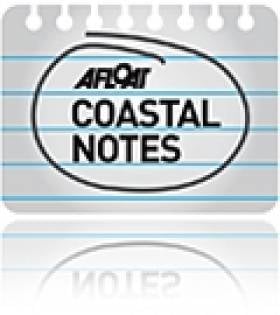Displaying items by tag: sound
Hydrophones Dropped Off Greenland Recording Sounds of Melting Arctic Icebergs to Fuel Irish Artist’s ‘Ocean Memory’ Project
An Irish artist is part of an international expedition that’s dropping hydrophones into the waters off Greenland to record the sounds of melting icebergs.
According to the Guardian, Siobhán McDonald will use the recordings from the underwater microphones in a mixed-media installation to explore human impact on the world’s oceans.
Over the next two years, the hydrophones will capture the sounds of melting Arctic sea ice and under subaquatic audio every hour — with the results being used both in scientific research and as part of a musical score McDonald will create with a composer.
My floating studio on expedition in the deepest part of the Greenland ocean. Just passed the awesome Greenland glacier yesterday. #arctic #water #northernlights #painting pic.twitter.com/Mk8sxSgh9W
— Siobhan McDonald (@SioMcDonald) October 11, 2022
“I’m interested in hearing the acoustic pollution,” the artist says. “The sea levels are rising and that will have an impact I’d imagine on the sound range and on all the biodiversity.
“Sound is fundamental in the ocean and Arctic animals. Hearing is fundamental to communication, breeding, feeding and ultimately survival. It speaks of the necessity of paying attention to the pollution we are causing to the ecosystems around us.”
The Guardian has much more on the story HERE.
Dolphin Group Comments on Dalkey Island Prospect
#DALKEY ISLAND PROSPECT - The Irish Whale and Dolphin Group (IWDG) has joined the chorus of opposition to the proposed oil and gas exploration off Dalkey Island in Co Dublin.
As previously reported on Afloat.ie, Providence Resources has applied for a foreshore licence to search for oil or gas about 6km out to sea on the Kish Bank Basin.
But the prospect has provoked a split in the local community over the potential risks and benefits, with many calling for a public enquiry into the licence before it is granted.
This evening an urgent meeting in Dun Laoghaire will address the public's concerns, which have been echoed by the IWDG.
"The Kish Bank and adjacent waters are important for cetaceans," said the group in a statement. "In addition, sightings of bottlenose dolphins have increased dramatically in the area following the presence of a group of three individuals since August 2010."
The IWDG is concerned about the potential effects on dolphins and porpoises that "could due to noise generated from the drilling process", noting that "there is little published data on the intensity and effects of sound generated by drilling".
Protest group Protect Our Coast has launched a online petition against the Dalkey Island Prospect citing concerns over the proximity of the drilling area to the mainland as well as the Special Protection Area of Dalkey Island, which is a haven for marine wildlife.
- Irish Whale and Dolphin Group
- IWDG
- Dalkey Island Prospect
- Coastal Notes
- Dalkey Island
- Dublin
- oil and gas
- exploration
- drilling
- Providence Resources
- foreshore licence
- Kish Bank Basin
- community
- Dun Laoghaire
- bottlenose dolphins
- Porpoises
- Cetaceans
- noise
- sound
- Protect Our Coast
- protest
- petition
- Special Protection Area
- marine wildlife
























































